Fleurs du Mal Magazine


Or see the index
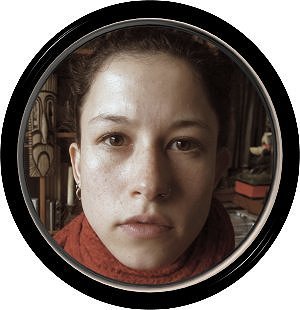
Esther Porcelijn
Berlijn
Goed, voordat het 11 januari is en de nieuwjaarswensvermoeidheid toeslaat (11 januari is dan het magische getal, volgens mijn moeder), zal ik ook even mededelen waar ik ben geweest met oud en nieuw: In Berlijn.
Mijn Amsterdamse vrienden gapen zich rot als ze dit horen: “Berlijn ja? O, echt zoo 2011, iedereen is al in Berlijn geweest, en iedereen gaat altijd met oud en nieuw naar Berlijn.”
Het is waar, er waren veel Nederlanders in Berlijn en ik wist dat er ook kennissen in Berlijn zouden zijn. Dus, inderdaad, origineel is het niet. Maar het is wel ontzettend terecht om daar te zijn met oud en nieuw en eigenlijk altijd wel, Berlijn is namelijk waanzinnig!
De mensen zijn er open en vriendelijk en er zijn veel kunstenaars die ook daadwerkelijk leuke avonden organiseren en galeries in verlaten gebouwen openen. Er zijn heel veel feestjes en die worden vooral georganiseerd in clubs in industriële oude gebouwen. Zo gingen wij naar een feest dat plaatsvond in een oud zwembad, alle gangen en ketels waren paars of groen verlicht en er waren hele hallen met knoppen en wieltjes waar je aan kan draaien en de DJ draaide er minimal music of techno. De feestgangers staan er wel allemaal als autisten bij; hoofd richting de DJ en introvert minimalistisch aan het dansen, niemand danst er ‘samen’.
De drank is er goedkoop en ze hebben er wodka bij de Lidl. De metro rijdt er in het weekend de hele nacht en alles in Berlijn is hierdoor heel goed en snel bereikbaar. Je kan er betaalbaar wonen in prachtige grote appartementen die voornamelijk gedeeld worden als in een studentenhuis. De bewoners van die appartementen geven ook weer veel feesten waarbij het hele complex de deuren open stelt of anders wel hun kelder. De eerste studie daar is spotgoedkoop en studeren levert ook daar veel voordelen op met kortingen voor musea en zelfs verzekeringen.
En overal zijn leuke markten met tweedehands meubels en kleding, overal zijn antiekwinkeltjes en antiquariaten. Het enige nadeel als inwoner van Berlijn is dat ze in Duitsland geen minimumloon hanteren, sommige studenten werken er echt voor een peulenschil en zijn ook onverzekerd.
Met oud en nieuw zijn mijn vriendje en een vriend wel geslagen op straat. In Berlijn houden ze enorm van knallende rotjes en knallende vuurpijlen. Door de straten vliegen ze je om de oren en tegen de ramen en in de bomen, nog veel meer dan in Nederland. Wij probeerden ons hier een weg door te banen en toen mijn vriendje en de vriend achter ons liepen om naar een feestje te gaan, staken zij een rotje af en werden op hun bek geslagen. De vriend heeft toen een volle tas met drankflessen tegen het hoofd van de aanvaller gesmeten. Ik liep terug om ze te halen en zag hun bebloede hoofden met beurse ogen. Het gaat nu prima met ze, wat ijs tegen hun blauwe ogen hielp goed.
Verder is het dus geweldig in Berlijn, een aanrader voor iedereen.
En als je over de universiteitsterreinen loopt dan voel je een anarchistische sfeer die in Tilburg ver te zoeken is. Niks geen kale betonnen gebouwen en posters van zakensymposia maar druk discussiërende mensen en overal posters van debatten en lezingen, feesten en bijeenkomsten en dan met muziek die wel even iets verder gaat dan meatloaf of de top40. Ik wil niet als een oud wijf klinken maar onze Uni is echt heel heel braaf vergeleken met die in Duitsland.
Ik zou jullie allemaal naar Berlijn willen meenemen volgend oud en nieuw, maar jullie zijn er vast al heel vaak geweest en kennen de bruisende kunstzinnige vrije sfeer daar waarschijnlijk al door en door.
Happy New Year.
Esther Porcelijn in Univers Blog
photo jefvankempen
fleursdumal.nl magazine
More in: Porcelijn, Esther, Porcelijn, Esther
.jpg)
Amy Levy
(1861-1889)
To Vernon Lee
On Bellosguardo, when the year was young,
We wandered, seeking for the daffodil
And dark anemone, whose purples fill
The peasant’s plot, between the corn-shoots sprung.
Over the grey, low wall the olive flung
Her deeper greyness ; far off, hill on hill
Sloped to the sky, which, pearly-pale and still,
Above the large and luminous landscape hung.
A snowy blackthorn flowered beyond my reach;
You broke a branch and gave it to me there;
I found for you a scarlet blossom rare.
Thereby ran on of Art and Life our speech;
And of the gifts the gods had given to each–
Hope unto you, and unto me Despair
Amy Levy poetry
fleursdumal.nl magazine
More in: Amy Levy, Archive K-L, Levy, Amy

George Sand
(1804-1876)
Chatterton
Quand vous aurez prouvé, messieurs du journalisme,
Que Chatterton eut tort de mourir ignoré,
Qu’au Théâtre-Français on l’a défiguré,
Quand vous aurez crié sept fois à l’athéisme,
Sept fois au contresens et sept fois au sophisme,
Vous n’aurez pas prouvé que je n’ai pas pleuré.
Et si mes pleurs ont tort devant le pédantisme,
Savez-vous, moucherons, ce que je vous dirai ?
Je vous dirai : ” Sachez que les larmes humaines
Ressemblent en grandeur aux flots de l’Océan ;
On n’en fait rien de bon en les analysant ;
Quand vous en puiseriez deux tonnes toutes pleines,
En les faisant sécher, vous n’en aurez demain
Qu’un méchant grain de sel dans le creux de la main. ”
George Sand poetry
fleursdumal.nl magazine
More in: Archive S-T, Chatterton, Thomas, George Sand, Thomas Chatterton
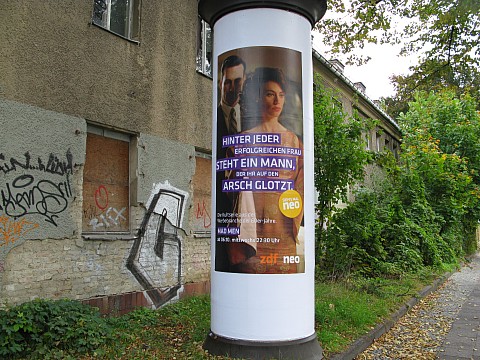

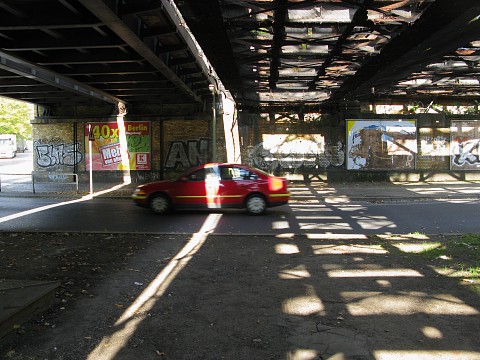

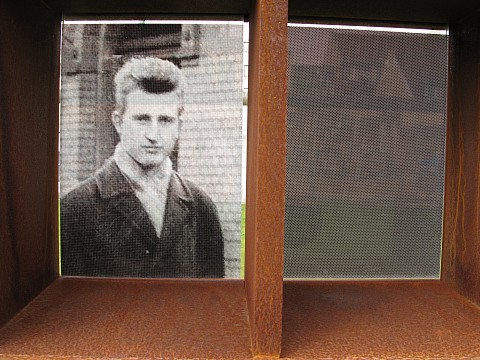
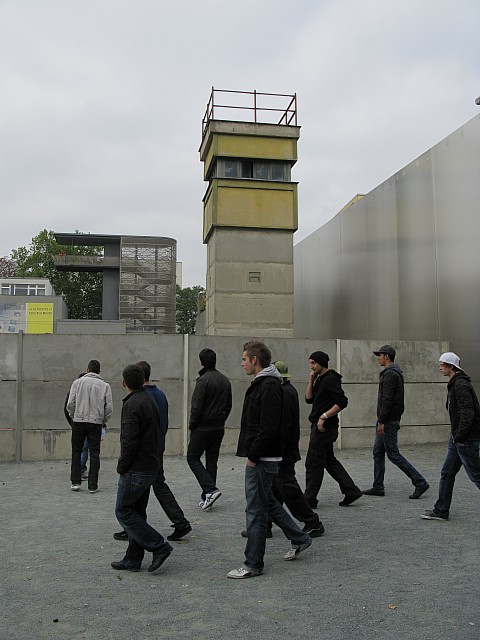







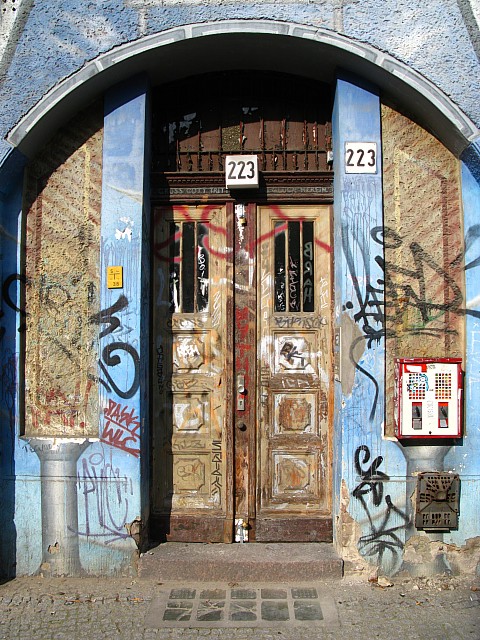
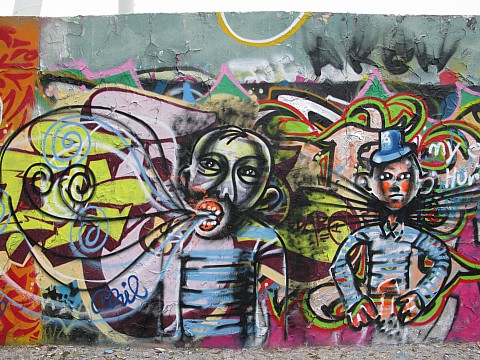
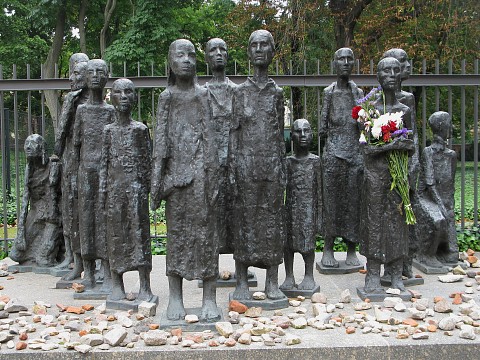

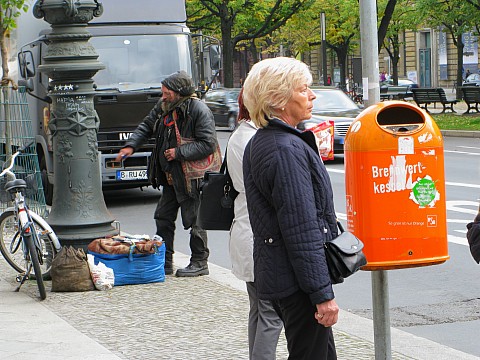
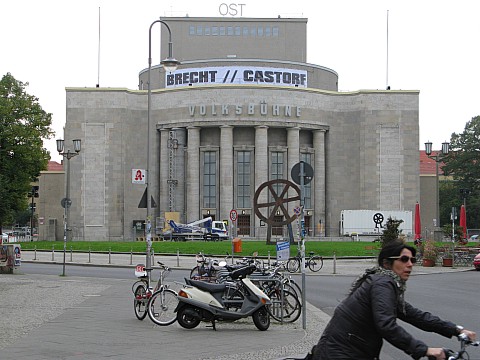
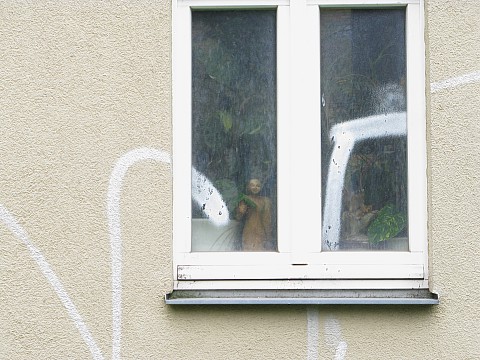

Anton K.: Pictures of a journey to Berlin, 2009
Mit ein gedicht von Paul Boldt (1885-1921)
Berlin
Die Stimmen der Autos wie Jägersignale
Die Täler der Straße bewaldend ziehn.
Schüsse von Licht. Mit einem Male
Brennen die Himmel auf Berlin.
Die Spree, ein Antlitz wie der Tag,
Das glänzend meerwärts späht nach Rettern,
Behält der wilden Stadt Geschmack,
Auf der die Züge krächzend klettern.
Die blaue Nacht fließt in der Forst.
Sie fühlt, geblendet, daß du lebst.
Schnellzüge steigen aus dem Horst!
Der weiße Abend, den du webst,
Fühlt, blüht, verblättert in das All.
Ein Menschenhände-Fangen treibst du
Um den verklungnen Erdenball
Wie hartes Licht; und also bleibst du.
Wer weiß, in welche Welten dein
Erstarktes Sternenauge schien,
Stahlmasterblühte Stadt aus Stein,
Der Erde weiße Blume, Berlin.
Paul Boldt (1914)
fleurs du mal magazine
More in: Anton K. Photos & Observations, Boldt, Paul, FDM in Berlin, Nachrichten aus Berlin
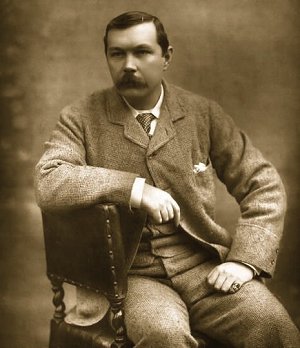
Arthur Conan Doyle
(1859-1930)
The Message
(From Heine)
Up, dear laddie, saddle quick,
And spring upon the leather!
Away post haste o’er fell and waste
With whip and spur together!
And when you win to Duncan’s kin
Draw one of them aside
And shortly say, “Which daughter may
We welcome as the bride?”
And if he says, “It is the dark,”
Then quickly bring the mare,
But if he says, “It is the blonde,”
Then you have time to spare;
But buy from off the saddler man
The stoutest cord you see,
Ride at your ease and say no word,
But bring it back to me.
Arthur Conan Doyle poetry
fleursdumal.nl magazine
More in: Archive C-D, Arthur Conan Doyle, Doyle, Arthur Conan
![]()
In Memoriam
schrijver en dichter Michel van der Plas
De schrijver Michel van der Plas is zondag 21 juli 2013 op 85-jarige leeftijd overleden. Hij was al geruime tijd ziek.
Michel van der Plas, een pseudoniem van Ben Brinkel, werd bekend als tekstschrijver voor cabaretiers, zoals Wim Sonneveld, Wim Kan en Frans Halsema.
Verder was hij actief als journalist (Elseviers Weekblad), vertaler, dichter en biograaf. Zijn biografieën over katholieke figuren als Guido Gezelle, Joseph Alberdingk Thijm en Anton van Duinkerken, kregen onvoldoende waardering.
• fleursdumal.nl magazine
More in: Anton van Duinkerken, Archive O-P, Gezelle, Guido, In Memoriam

Samenkomst
De kilte warmt de kamer op
er wordt geen woord gesproken
alsof de hele wereld is ingeslikt
hij kijkt naar buiten
ik in de ruimte rond
de gedachten ploeteren door herinneringen
een vlieg
afgesneden van de vrijheid
bromt haar leven bij elkaar
rinkelgeluid
handen grijpen naar de gsm
ik zie dat hij een trui aan heeft
met rolkraag
Erica De Stercke
fleursdumal.nl magazine
More in: Archive C-D, De Stercke, Erika

Tijdbom
Woorden zijn gordijnen die je toedoet
zodra het spektakel is afgelopen het
waren mooie beelden een stuk of acht
jongens die in het midden van de nacht
iemand aanvielen en helemaal verrot
schopten na de daden komen dan altijd
de woorden die van afschuw het eerst
dan is het gevaar geweken kunnen we
de toedracht gaan verklaren deze tijden
zijn van teruggang en onbegrip dat vatten
we onvermijdelijk persoonlijk op hoe kan
dit mij overkomen een frustratio die er
toe doet die smeekt om een uitlaatklep
het grote verklaren is begonnen na ieder
conflict begrijpen we meer tot begrip ook
niet meer helpt en het recht van de sterkste
geldt deze woorden zijn gordijnen die
je dicht doet als je het denkraam sluit
een tijdbom wordt terloops ontploft.
Martin Beversluis
fleursdumal.nl magazine
More in: Archive A-B, Beversluis, Martin
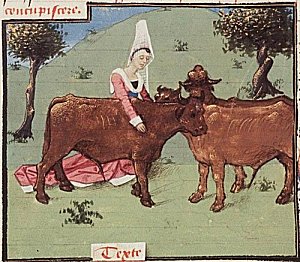
Christine de Pisan
(ca. 1364-1430)
Belle, ce que j’ay requis
Belle, ce que j’ay requis
Or le vueilliez ottroier,
Car par tant de fois proier
Bien le doy avoir conquis.
Je l’ay ja si long temps quis,
Et pour trés bien emploier,
Belle, ce que j’ay requis.
Se de moy avez enquis,
Ne me devez pas noyer
Mon guerdon, ne mon loier;
Car par raison j’ai acquis,
Belle, ce que j’ay requis.
Christine de Pisan poetry
fleursdumal.nl magazine
More in: Archive O-P, Pisan, Christine de
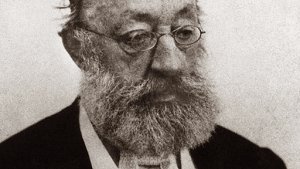
Gottfried Keller
(1819–1890)
Abend auf Golgatha
Eben die dornige Krone geneiget, verschied der Erlöser,
Weißlich in dämmernder Luft glänzte die Schulter des Herrn?
Siehe, da schwebte, vom tauigen Schimmer gelockt, die Phaläne
Flatternd hernieder zu ruhn dort, wo gelastet das Kreuz.
Langsam schlug sie ein Weilchen die samtenen Flügel zusammen,
Breitet’ sie aus und entschwand fern in die sinkende Nacht.
Nicht ganz blieb verlassen ihr Schöpfer: den Pfeiler des Kreuzes
Hielt umfangen das Weib, das er zur Mutter sich schuf.
Gottfried Keller poetry
fleursdumal.nl magazine
More in: Archive K-L, Keller, Gottfried
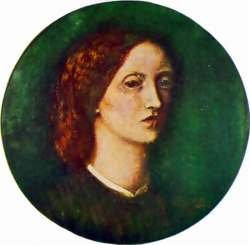
Elizabeth (Lizzie) Siddal
(1829-1862)
Four Poems
A Silent Wood
O silent wood, I enter thee
With a heart so full of misery
For all the voices from the trees
And the ferns that cling about my knees.
In thy darkest shadow let me sit
When the grey owls about thee flit;
There will I ask of thee a boon,
That I may not faint or die or swoon.
Gazing through the gloom like one
Whose life and hopes are also done,
Frozen like a thing of stone
I sit in thy shadow but not alone.
Can God bring back the day when we two stood
Beneath the clinging trees in that dark wood?

He and She and Angels Three
Ruthless hands have torn her
From one that loved her well;
Angels have upborn her,
Christ her grief to tell.
She shall stand to listen,
She shall stand and sing,
Till three winged angels
Her lover’s soul shall bring.
He and she and the angels three
Before God’s face shall stand;
There they shall pray among themselves
And sing at His right hand.
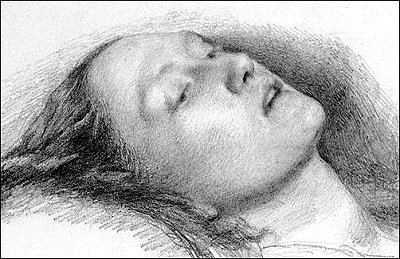
Early Death
Oh grieve not with thy bitter tears
The life that passes fast;
The gates of heaven will open wide
And take me in at last.
Then sit down meekly at my side
And watch my young life flee;
Then solemn peace of holy death
Come quickly unto thee.
But true love, seek me in the throng
Of spirits floating past,
And I will take thee by the hands
And know thee mine at last.

Dead Love
Oh never weep for love that’s dead
Since love is seldom true
But changes his fashion from blue to red,
From brightest red to blue,
And love was born to an early death
And is so seldom true.
Then harbour no smile on your bonny face
To win the deepest sigh.
The fairest words on truest lips
Pass on and surely die,
And you will stand alone, my dear,
When wintry winds draw nigh.
Sweet, never weep for what cannot be,
For this God has not given.
If the merest dream of love were true
Then, sweet, we should be in heaven,
And this is only earth, my dear,
Where true love is not given.
Elizabeth (Lizzie) Siddal – poetry
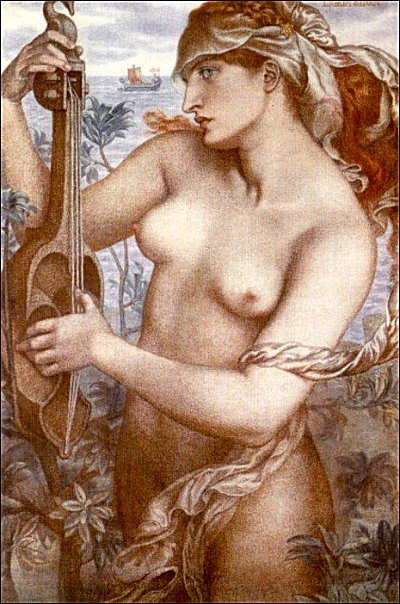
fleursdumal.nl magazine
More in: Lizzy Siddal, Siddal, Lizzy
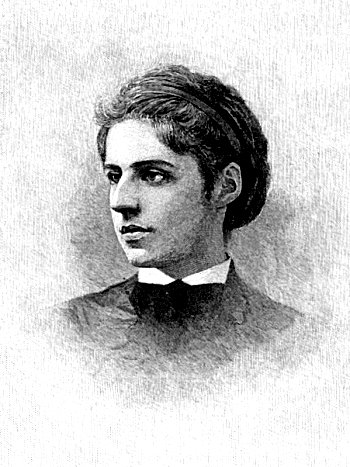
Emma Lazarus
(1849–1887)
Dreams
A dream of lilies: all the blooming earth,
A garden full of fairies and of flowers;
Its only music the glad cry of mirth,
While the warm sun weaves golden-tissued hours;
Hope a bright angel, beautiful and true
As Truth herself, and life a lovely toy,
Which ne’er will weary us, ne’er break, a new
Eternal source of pleasure and of joy.
A dream of roses: vision of Loves tree,
Of beauty and of madness, and as bright
As naught on earth save only dreams can be,
Made fair and odorous with flower and light;
A dream that Love is strong to outlast Time,
That hearts are stronger than forgetfulness,
The slippery sand than changeful waves that climb,
The wind-blown foam than mighty waters’ stress.
A dream of laurels: after much is gone,
Much buried, much lamented, much forgot,
With what remains to do and what is done,
With what yet is, and what, alas! is not,
Man dreams a dream of laurel and of bays,
A dream of crowns and guerdons and rewards,
Wherein sounds sweet the hollow voice of praise,
And bright appears the wreath that it awards.
A dream of poppies, sad and true as Truth,—
That all these dreams were dreams of vanity;
And full of bitter penitence and ruth,
In his last dream, man deems ’twere good to die;
And weeping o’er the visions vain of yore,
In the sad vigils he doth nightly keep,
He dreams it may be good to dream no more,
And life has nothing like Death’s dreamless sleep.
Emma Lazarus poetry
fleursdumal.nl magazine
More in: - Archive Tombeau de la jeunesse, Archive K-L, Lazarus, Emma
Thank you for reading Fleurs du Mal - magazine for art & literature